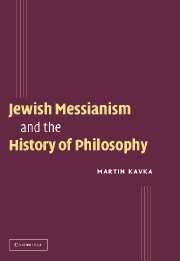Book contents
- Frontmatter
- Contents
- Acknowledgments
- List of Abbreviations
- Introduction: From Athens to Jerusalem
- 1 The Meontological Conundrum: Emmanuel Levinas and Emil Fackenheim on the Athens–Jerusalem Conflict
- 2 Beyond “Beyond Being”: Nonbeing in Plato and Husserl
- 3 Nonbeing as Not-Yet-Being: Meontology in Maimonides and Hermann Cohen
- 4 Nonbeing Ensouled, Nonbeing Embodied: Levinas versus Rosenzweig on the Role of the Other in Messianic Anticipation
- Conclusion: Deepening the Roots of the Jewish Meontological Tradition, or contra the Derridean “Messianic”
- Works Cited
- Index
3 - Nonbeing as Not-Yet-Being: Meontology in Maimonides and Hermann Cohen
Published online by Cambridge University Press: 09 July 2009
- Frontmatter
- Contents
- Acknowledgments
- List of Abbreviations
- Introduction: From Athens to Jerusalem
- 1 The Meontological Conundrum: Emmanuel Levinas and Emil Fackenheim on the Athens–Jerusalem Conflict
- 2 Beyond “Beyond Being”: Nonbeing in Plato and Husserl
- 3 Nonbeing as Not-Yet-Being: Meontology in Maimonides and Hermann Cohen
- 4 Nonbeing Ensouled, Nonbeing Embodied: Levinas versus Rosenzweig on the Role of the Other in Messianic Anticipation
- Conclusion: Deepening the Roots of the Jewish Meontological Tradition, or contra the Derridean “Messianic”
- Works Cited
- Index
Summary
In the previous chapter, I argued that Levinas misinterpreted the Platonic arguments he uses to justify his critical meontology; Plato cannot get past the dialectical meontology in which otherness can refer only to other objects, and not to a transcendent realm. Nevertheless, there are phenomenological arguments, notably from the third of Husserl's Logical Investigations, that can justify the Levinasian view of nonbeing as absolute otherness. These arguments, however, do not give evidence for critical meontology over and above dialectical meontology; it is not the case that Husserl proves Levinas to be true and Fackenheim to be false. Rather, they argue for a correlation of the two kinds of meontology; the two kinds of nonbeing are shown to be non-independent. The otherness beyond being announces itself in the other being that is not me.
In this chapter, I will show that in Maimonides and Cohen, nonbeing refers to the material realm, which is deprived of a perfect form – the realm of privation is to mē on. Human existence begins in the nonbeing that is lack, and its task is to near (as fully as possible) the nonbeing that is fullness, the nonbeing above being. Given that teleology is part of the natural structure of existence, meontology opens up a realm of futurity and the process of approaching the telos is given normative value. Meontology necessitates ethics. Nevertheless, I also offer critiques of both Maimonidean and Cohenian ethics.
- Type
- Chapter
- Information
- Jewish Messianism and the History of Philosophy , pp. 66 - 128Publisher: Cambridge University PressPrint publication year: 2004



